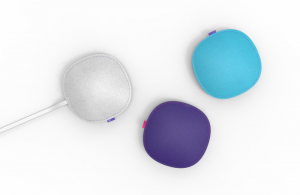The Lully Sleep Guardian is a Bluetooth-enabled pod that pairs with an iPhone app, to prevent a child from entering an “unhealthy state of sleep,” when night terrors typically occur. The pod uses gentle, timed vibrations. A good night’s sleep for a child typically means the same for a parent. But night terrors can make middle-of-the-night wakings more frequent and can leave parents feeling helpless. This new device wants to fend off night terrors by rousing a child into a lighter sleep stage.
The pod is double the surface area and about the same width as a hockey puck and is meant to be placed under the mattress, near the child’s torso. A companion app will notify parents to turn on the device before 11 p.m. every night, unless they choose to go to bed later. Lully co-founder and physician Andy Rink understands first-hand how disruptive night terrors can be to a family’s quality of life. Sleep terrors, or more colloquially, “night terrors,” are a minor sleep disorder that most kids will grow out of. They affect 3-4 percent of children ages 2-12, with cases ranging from mild to severe.
Lully works on the idea of “scheduled awakenings,” essentially rousing the child from deep sleep before any unsettling episode can begin. The company claims Lully is “scientifically proven to stop night terrors,” citing a clinical study which resulted in 90 percent of night terrors being prevented. Lully can also reportedly help children who wet the bed, talk in their sleep, and walk in their sleep. Especially if the problems usually occur at around the same time each night. Lully consists of two elements. A silently vibrating pod and a smartphone app for iOS devices. The pod sits under the child’s mattress, communicating with a smartphone via Bluetooth Low Energy (BLE). It is designed to vibrate for a period of three minutes as the child would be entering the deep sleep phase during which the night terrors would usually occur. The app tracks the child’s sleep pattern, thus helping parents know when to turn Lully on every night. Parents will only need to turn the device on once a night, and the company says this will always be before 11 pm.
The company advises Lully be used for four weeks, with the app tracking the usage. At that point, Lully can be switched off and called into action if and when the night terrors (or other associated problems) return. It should be noted that Lully doesn’t prevent a child from enjoying any deep sleep, but instead keeps them in “the safe, healthy stage of deep sleep” as opposed to the “unhealthy deep sleep” when problems usually occur. As Lully is not regarded as a medical device, it therefore doesn’t need FDA approval or a prescription. However, parents of children under the age of two are advised to consult a doctor before using it.
For more information please visit: http://www.lullysleep.com

